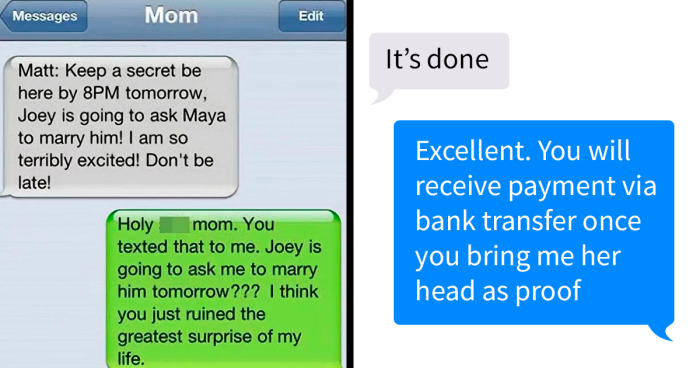If you’re a proud owner of a cell phone, chances are you’ve received a mysterious text from an unknown number. Most likely, you sent back a quick message in response, letting them know that they mixed up the digits or just simply ignored it. But some people just can’t resist the opportunity to play along with the anonymous sender, resulting in some of the funniest interactions.
We’ve gathered some of them in this list, courtesy of the r/wrongnumber subreddit. Scroll down to find happy accidents that probably brightened someone’s day, and be sure to share your own similar encounters below! While you’re at it, don’t forget to check out a conversation with cybersecurity and privacy specialist Jonathan Steele and cybersecurity specialist Sam J. Brown, who kindly agreed to tell us about the malicious intent that sometimes hides behind wrong number texts.
1: My Heart

While receiving a wrong number text can sometimes lead to amusing outcomes, there’s quite a high chance that the person who ‘accidentally’ mixed up the digits is trying to get the conversation going just enough to deceive you.
This is called a ‘wrong number text’ scam. In the first half of last year, Americans received over 10 billion spam and scam texts per month, and wrong-number text scams are just one type of them. The aforementioned can be especially sneaky and are seen as a growing problem.
2: Brilliant Team Work

To learn more about this type of scam and its prevention methods, Bored Panda reached out to cybersecurity and privacy specialist Jonathan Steele and cybersecurity specialist Sam J. Brown.
Brown explains, “Scammers use a tactic known as social engineering, where they try to manipulate people into giving up personal information or performing actions that compromise their security. These messages are often made to seem casual and innocent, like “Is this John?” or “Hey, long time no see!”—something that might make you think it’s just a mistaken text.”
3: Not Hannah

Once the targeted person is engaged, they may start asking for personal information or send malicious links. “In some cases, scammers may even try to impersonate someone you know from an unknown number, using familiar language or details to trick you into trusting them and letting your guard down. When in doubt, don’t engage—hang up or ignore the text, and contact the person directly using the number you already have for them,” warns Brown.
Steele also mentions that the wrong number texts can further escalate into more consequential scams like phishing, pig butchering, or romance scams, all in hopes of extracting personal or financial information.
4: Nah You Right

To stay safe against scammers’ attempts, it’s important to know how to recognize when they’re happening. “Key signs include vague introductions, responses to nonexistent conversations, urgent requests for personal details, or links to unfamiliar sites,” tells us Steele.
5: I Don’t Know Why They Didn’t Reply

Meanwhile, Brown says that the first red flag we should notice is the unknown number that is asking questions or trying to start a conversation.
Another warning sign could be strange conversation starters. “Scammers often use vague messages like “Who is this?” or “Is this [random name]?” to get a response. Once you engage, they may try to gather more information or convince you to click a link,” says Brown.
6: I Feel Like A Bad Person…

Requests for personal information are an additional bright red flag that people should identify right away. “Scammers might try to create urgency or appeal to your emotions to prompt a quick response. Messages like “I’m in trouble” or “You’ve won a prize” are designed to make you act before thinking,” Brown adds. “Be highly suspicious of texts that include links or ask you to download something. These could lead to websites that try to steal your information or infect your device with malware.”
7: Inconceivable!

So if you receive a text from an unknown number, the safest thing to do is delete it without replying. “Responding could confirm that your number is active, making you more of a target,” notes Brown. “Never click on links in texts from people you don’t know, as they could lead to phishing websites or install harmful software on your phone. Most smartphones let you block and report suspicious numbers, which can stop further messages.”



